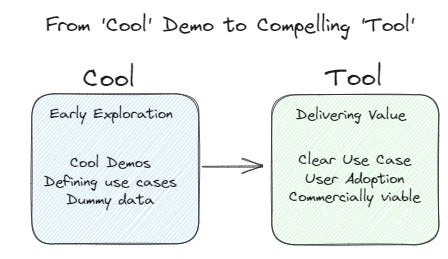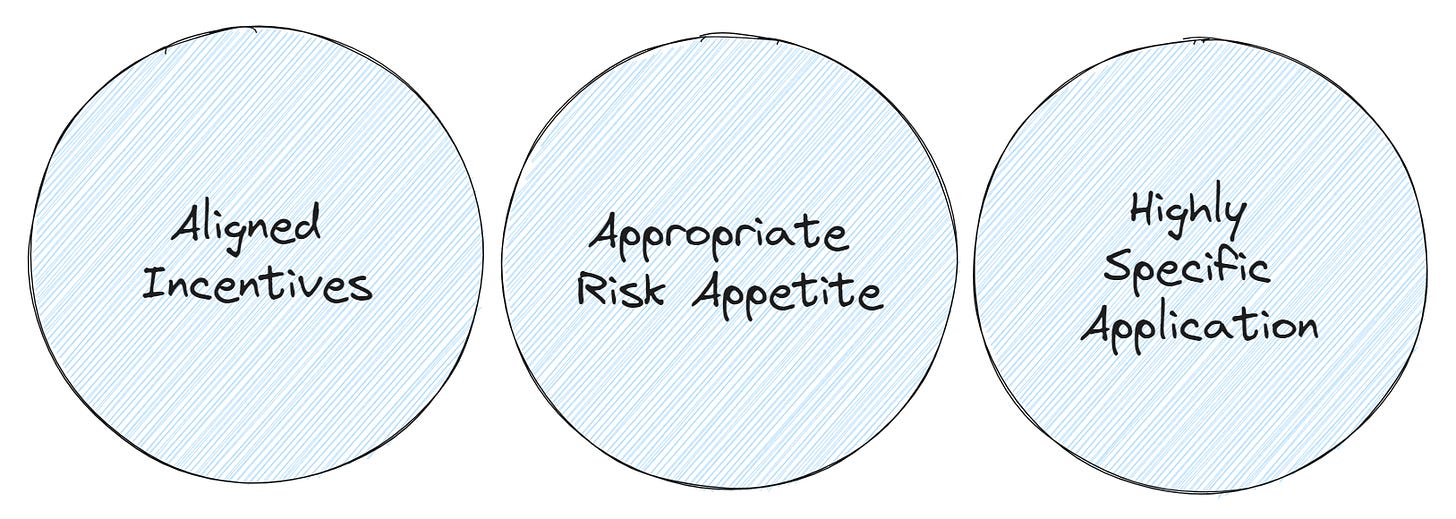Legal Tech Trends Newsletter: #13
Generative AI in production, Microsoft co-pilot, Law Firm loans and much more!
Happy Friday, and welcome to the 13th edition of Legal Tech Trends!👋
This edition features a special guest appearance from Alex Herrity, Director of Legal Solutions at Adidas. We discuss the application of generative AI for in-house teams, Microsoft co-pilot pricing, and the illusion of leapfrogging hard work.
You can listen to our 14-minute conversation here:
This audio format is experimental. As with all firsts, expect it to be rough and ready. Let me know if you enjoy it or how it can serve you best. Do these topics strike a chord with you? Or what market developments are keeping you awake at night?
Lessons Deploying Gen AI to Paying Legal Customers
The race to launch generative AI features continues at a frantic pace. Law firms and legal tech providers are busy exploring use cases, assessing technical capabilities and the commercial liabilities of new products.
There is a big difference between cool demos which dazzle and compelling tools which deliver value.
I’ve had many interesting conversations with law firms and legal techs who are making good progress transitioning from the ‘Cool’ to ‘Tool’ stage of maturity.
Last week I caught up with the team from LegalOS for an in-depth discussion about the work they’re doing to automate high-frequency legal requests for in-house teams. Their ‘Legal On-Demand’ bots support business users through large language models embedded in channels such as Slack and MS Teams.
Exploring generative AI in sandbox scenarios is fun, but deploying tech in production environments to deliver value to paying customers has to be the end goal. LegalOS are doing just that, and I’m happy to share some takeaways from my conversation with the founders Jake and Lili.
Aligning Incentives | How does the tech impact the business model?
In-house teams are a cost centre with a clear incentive to reduce costs and enable the business. There is an immediate and obvious need for tools which can enable the business to move at pace, save costs, and reduce low-value legal queries.
Law firm fee earners typically charge by the hour. What happens if they can complete a task significantly faster? Will this lead to a reduction in work for a profit centre that bills clients by the hour? Billing models can change, but this requires additional work before incentives are clearly aligned.
Appropriate Risk Appetite | How open are infosec teams and users to new tech?
In-house legal and infosec teams often have a greater risk appetite and freedom to work with newer suppliers. This is especially true for scale-ups. It’s far easier for suppliers to pass infosec and data privacy requirements with these customers.
Law firms are risk averse. Reputation is everything and they can’t take chances with sensitive client data. It is extremely hard for new suppliers to pass infosec and data privacy requirements.
Highly Specific Application | Generic solutions give generic outputs.
LegalOS focus on a highly specific use case and have applied their technical talent to refine the data pipeline to process inputs and steer numerous LLMs.
Even with this focus, the process still caters for full human oversight and the ability for humans to refine the outputs to enhance future use.
Given the effort needed to successfully apply the technology to this use case, it raises questions about the ability to apply LLMs to broader use cases without extensive customisation. (See Microsoft co-pilot thoughts below)
Interestingly, at this point, if an LLM returns results too quickly, it suggests less pre and post-processing of data, fewer safeguards, and the potential for lower quality outputs.
It reminds me of the classic maths joke:
Interviewer: "I heard you were extremely quick at math"
Me: "yes, as a matter of fact I am"
Interviewer: "Whats 14x27"
Me: "49"
Interviewer: "that's not even close"
Me: "yeah, but it was fast”
AI News
💵 Microsoft co-pilot will cost $30/user/month. The launch date is still unknown.
Lawyers spend the majority of their day in Word and Outlook, so Microsoft’s generative AI product sounds promising, with procurement likely to be far easier than other generative AI providers. But at $30/user/month, on top of the standard Microsoft license pricing, the costs add up fast. And given that co-pilot is a feature used for a variety of business use cases, it will be interesting to see how the outputs compare to standalone products laser-focused on specific legal needs. LINK
🧑⚖️ Kira Sues Former VP, now at AI Startup DeepJudge, Alleging Breach of Contract
Our last edition covered the launch of DeepJudge, a product using natural language to allow a better search of document management systems. They’re back in the headlines, but for less favourable reasons this time. LINK
❌ Use of ChatGPT prohibited on Michigan Law School applications
There is no way to prove that ChatGPT has been used, and they won’t be able to enforce the rule. As many ponder how AI may be able to assist lawyers, it’s interesting to see the law school’s stance against the use of generative AI for applications. LINK
💡In the age of gen AI, legal KM is more important than ever - McKinsey Legal
Some folks are suggesting/hoping that generative AI may do away with the need for robust KM practices. I side with those who believe that KM will play a crucial role in attempts to deploy generative AI for legal use cases. LINK
↘️ JPMorgan play down near short impact of generative AI
GenAI represents “the biggest tech wave since cloud or mobile”, but this article suggests for the next few years, most spending will be to organise messy databases, disabuse management of delusions and direct capex towards tasks suitable for turbocharging with what’s in effect, a whizzy form of autocomplete. LINK
Round-up
❌ The Impact of fear-based pricing - How law firms can stop rate degradation
Despite a lot of chatter in the market about client pushback, the data actually says that law firms keep raising rates, and clients keep paying. However, a key driver for a drop in realisation rates is ad-hoc partner-applied discounts, often with clients completely unaware of these discounts! LINK
💸 Law Firm Loans: Rocade Raises $470 Million to Back Mass Torts Law Firms
Litigation finance, the growing asset class in which investment firms pour money into lawsuits in exchange for a portion of the award, also includes the law firm loan sector. Unlike investments in individual suits that only have payoffs if there’s an award, law firm loans go toward the firm itself and are required to be paid back with interest. Rocade typically provides loans in the mass tort sector, ranging from $10 million to more than $100 million. This fund will likely finance 20 to 25 US firms. LINK
I find litigation funding fascinating, so if you’re doing anything cool in this space, please let me know!
Books & Podcasts
📚 Big Law Confidential: The Comprehensive Guide to the Large Law Firm Work Experience in the U.S.
This book provides a fascinating insight into US Big Law working life. I found it particularly interesting to see how rarely technology is mentioned, and when it is, it’s predominantly referenced as IT support to keep laptops running and defend against cyber attacks. Tech may be front and centre for those operating within our legal tech world, but it often plays a minor role in the lives of practising lawyers. LINK
🎙️ You Still Need to Put in the Work: Hyperdraft's Ashley Carlisle and Tony Thai on the AI Hype Cycle
Tony Thai and Ashley Carlisle from HyperDraft discuss the current status of generative AI in the legal field, highlighting the volume of misinformation about its capabilities which often leads to misdirected attempts to use it without a clear problem definition. LINK
🎙️Legal consequences of generated content
Damien Riehl answers questions about generated content, copyright, dataset licensing/usage, and the future of knowledge work. LINK
Adjacent Interests
🛡️ A framework to securely use LLMs in companies. Part 1: Overview of Risks. LINK
🔓 The Next Token of Progress: 4 Unlocks on the Generative AI Horizon. LINK
🎓 Lessons and learnings from building an enterprise-ready AI assistant. LINK
Aaand that’s a wrap. I’ll be hiking in Italy over the next two weeks, so the next edition drops on Friday, 18th August. In the meantime, to satisfy your curious legal tech mind, explore LegalTechTrends.com.
Thanks for reading. All feedback and suggestions are most welcome.
Have a great Friday!
Feel free to connect on LinkedIn for additional interesting content Here 👋





